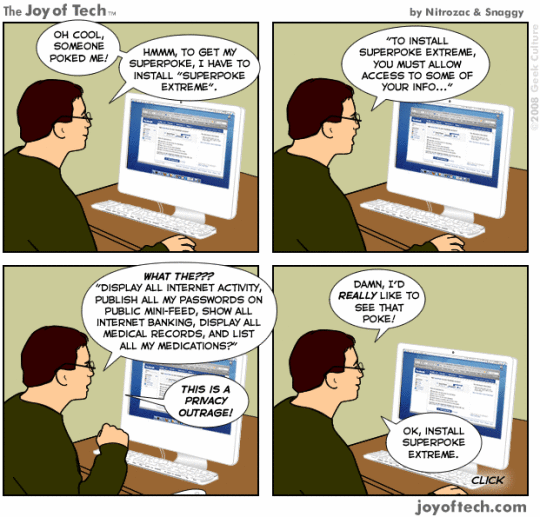
Image: CNET’s Surveillance State
Another Facebook privacy gaffe has hit the fan, thanks to a Wall Street Journal investigation. A number of popular Facebook apps, including Farmville, have been sharing information with third-party advertisers and data companies. The Wall Street Journal’s investigative report has more:
The apps, ranked by research company Inside Network Inc. (based on monthly users), include Zynga Game Network Inc.’s FarmVille, with 59 million users, and Texas HoldEm Poker and FrontierVille. Three of the top 10 apps, including FarmVille, also have been transmitting personal information about a user’s friends to outside companies.
Most apps aren’t made by Facebook, but by independent software developers. Several apps became unavailable to Facebook users after the Journal informed Facebook that the apps were transmitting personal information; the specific reason for their unavailability remains unclear.
The information being transmitted is one of Facebook’s basic building blocks: the unique “Facebook ID” number assigned to every user on the site. Since a Facebook user ID is a public part of any Facebook profile, anyone can use an ID number to look up a person’s name, using a standard Web browser, even if that person has set all of his or her Facebook information to be private. For other users, the Facebook ID reveals information they have set to share with “everyone,” including age, residence, occupation and photos.
The apps reviewed by the Journal were sending Facebook ID numbers to at least 25 advertising and data firms, several of which build profiles of Internet users by tracking their online activities….one data-gathering firm, RapLeaf Inc., had linked Facebook user ID information obtained from apps to its own database of Internet users, which it sells. RapLeaf also transmitted the Facebook IDs it obtained to a dozen other firms, the Journal found.
The applications transmitting Facebook IDs may have breached their own privacy policies, as well as industry standards, which say sites shouldn’t share and advertisers shouldn’t collect personally identifiable information without users’ permission.
Facebook once again proves that your privacy is the price of connecting with people online for free. Thank you, WSJ, for uncovering this.
